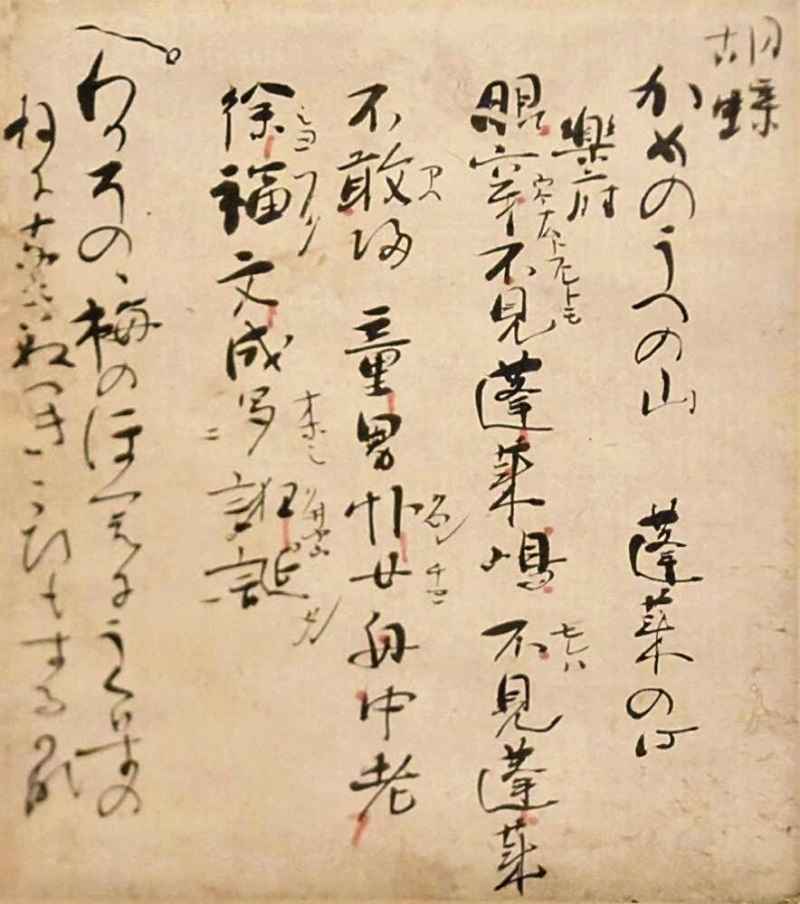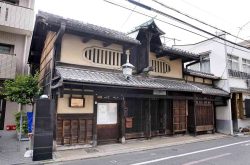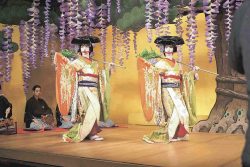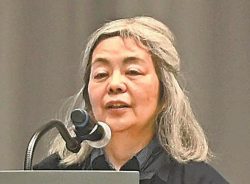
A discovered page from “Teika Hitsu Genji Monogatari Okuiri”
21:40 JST, May 12, 2022
A page from a book of commentary on “Genji Monogatari” (“The Tale of Genji”) by poet Fujiwara no Teika has been found, it has been learned.
Titled “Teika Hitsu Genji Monogatari Okuiri,” the book of commentary is designated as a national treasure, but at least 10 pages are missing.
Teika (1162-1241) had women in his household copy all 54 chapters of “The Tale of Genji” and he wrote annotations at the end of each chapter. These annotations were later cut off and made into a book of their own.
The newly discovered page is 16.7 centimeters high and 14.9 centimeters wide. Kazuomi Ikeda, a professor emeritus at Chuo University, bought the page as part of a hanging scroll from an antique dealer in Tokyo. Ikeda was told by the dealer that the handwriting on the material might be that of Teika.
Examination confirmed that worm-eaten spots on the page matched the shape of those on another page in the book of commentary. The pages are believed to have been close to each other in the book.
The handwriting was also confirmed to be Teika’s, due to his unique brushstrokes.
The discovered page contains an eight-line comment on “Kocho” (Butterflies), the 24th chapter of “The Tale of Genji.” Among other things, it refers to “kame no ue no yama” (the mountain above the tortoise) that appears in the banquet scene at the palace of Genji’s wife, Murasaki-no-ue, and is a reference to Mt. Horai which is considered to be a world of eternal youth and immortality. This episode is based on “Hakushi Monju” (Bai shi wen ji), a collection of poems by Tang Dynasty poet Bai Juyi.
A certificate of authenticity written by Fujigayatsu Tameeda was also found inside the box containing the scroll, saying the commentary was written by Teika.
Tameeda was a court noble who lived during the early days of the Edo period (1603-1867). The Fujigayatsu family is a branch of the Reizei family, descendants of the Teika family. A Tameeda daughter was in service to Emperor Reigen (1654-1732), who had his retainers copy “Teika Genji Monogatari Okuiri” during the Edo period.
Based on this evidence, the discovered page is believed to have been removed from the original edition of “Teika Hitsu Genji Monogatari Okuiri.”
“Since ancient times, tea ceremony aficionados have enjoyed cutting off parts of old books and pasting them on hanging scrolls,” Ikeda said. “Probably for the same reason, the discovered material was pasted on a hanging scroll that appears to have been created during or after the Meiji era (1868-1912).
Top Articles in Culture
-

BTS to Hold Comeback Concert in Seoul on March 21; Popular Boy Band Releases New Album to Signal Return
-

Lifestyle at Kyoto Traditional Machiya Townhouse to Be Showcased in Documentary
-

‘Jujutsu Kaisen’ Voice Actor Junya Enoki Discusses Rapid Action Scenes in Season 3, Airing Now
-

Tokyo Exhibition Offers Inside Look at Impressionism; 70 of 100 Works on ‘Interiors’ by Monet, Others on Loan from Paris
-

Japanese Film ‘Kokuho’ Receives Oscar Nod in Makeup, Hairstyling Category; Makeup Artist Kazu Hiro Also Nominated
JN ACCESS RANKING
-

Japan Institute to Use Domestic Commercial Optical Lattice Clock to Set Japan Standard Time
-

Israeli Ambassador to Japan Speaks about Japan’s Role in the Reconstruction of Gaza
-

Man Infected with Measles May Have Come in Contact with Many People in Tokyo, Went to Store, Restaurant Around When Symptoms Emerged
-

Prudential Life Insurance Plans to Fully Compensate for Damages Caused by Fraudulent Actions Without Waiting for Third-Party Committee Review
-

Woman with Measles Visited Hospital in Tokyo Multiple Times Before Being Diagnosed with Disease



























